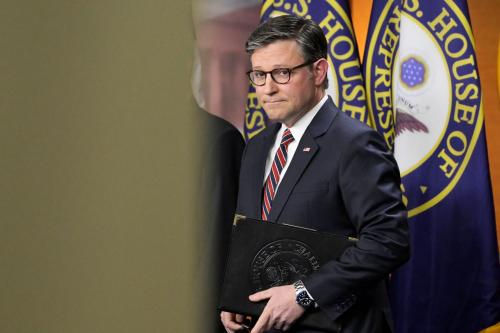In a speech sponsored by Opportunity 08 and the Tax Policy Center, Senator Obama spoke to the importance of reforming tax policy and promoted transparency as a critical means to that end. This is not empty rhetoric, as Obama successfully passed the Federal Funding Accountability and Transparency Act as well as parts of the Transparency and Integrity in Earmarks Act. Both bills mandate disclosure of Federal financial transactions to allow public scrutiny.
Transparency will be an important vehicle for reform in today’s information age and also offers ’08 candidates an important policy platform to reach out to young voters. This issue resonates with young voters like me, who historically have had the weakest sense of civic duty of all age groups, but are the demographic most comfortable with the cell phones, PDAs and other communications tools that are in large part responsible for the elevated importance of transparency.
The issue also crosses ideological lines, with Grover Norquist stating that “transparency is the next big thing,” in the Wall Street Journal. Joe Trippi made a similar point at a summer event co-sponsored by Opportunity ’08 on the future of political communications and young voters, arguing that candidates are going to be under the microscope of instant and wide-spread technology at an unprecedented level this cycle, haunted already by Senator George Allen’s macaca incident.
- Since ’08 hopefuls must deal with a certain level of enforced transparency, their challenge will be to use it in such a way that proves their authenticity and commitment to holding themselves and our government accountable.
The Sunlight Foundation leads the way in evaluating public officials on transparency, and in particular, developed a clever way to assess congressional members’ websites. They asked citizen journalists to investigate the websites of all congressional members for specific information, ranging from a member’s legislative and committee activities to financial disclosures, and then used these results to create a transparency grade. Of the presidential candidates currently in Congress, Senators Clinton, Obama and Brownback and Reps. Hunter and Paul tied for first place; Senator Biden and Reps. Kucinich and Tancredo fell in the middle and Senator Dodd came in last place.
The results revealed that public officials do not make available a lot of information online that they are legally required to disclose (although they are not mandated to do so through their websites, maybe they should be) and often don’t include basic information such as links to the bills they have sponsored or co-sponsored.
To gauge the transparency of all presidential candidates’ websites, I adapted the Sunlight questionnaire and did my own survey. Of all of the officially declared candidates, Ron Paul came out on top by having the only website to list all of the principals on his campaign staff. None of the candidates disclosed information about their financial contributors, included a full CV listing all previous employment with no gaps in time, or posted a full schedule (not just upcoming public events.) Overall, the candidates faired similarly in the survey, and this suggests they are not distinguishing themselves from one another with their websites’ transparency.
Who cares? Young voters do. Candidates have a real opportunity to set themselves apart from the competition. This is particularly important in the strategy to reach out to young voters, who will use the internet more than any other age group to obtain their information about campaign news.
And the next president? He or she has a unique opportunity to expand a commitment to transparency that was first kindled by Vice President Al Gore’s reinventing government initiative. Like it or not, a certain amount of transparency will be enforced upon the next administration by legions of blogs, cell phone paparazzi and interest groups. Instead of seeing it as a threat to which they must respond defensively, the next president and his or her staff should see it as an untapped opportunity to demonstrate their commitment to accountability for Americans of all ages.
The Brookings Institution is committed to quality, independence, and impact.
We are supported by a diverse array of funders. In line with our values and policies, each Brookings publication represents the sole views of its author(s).



Commentary
Op-edTransparency & 08 Election
October 23, 2007